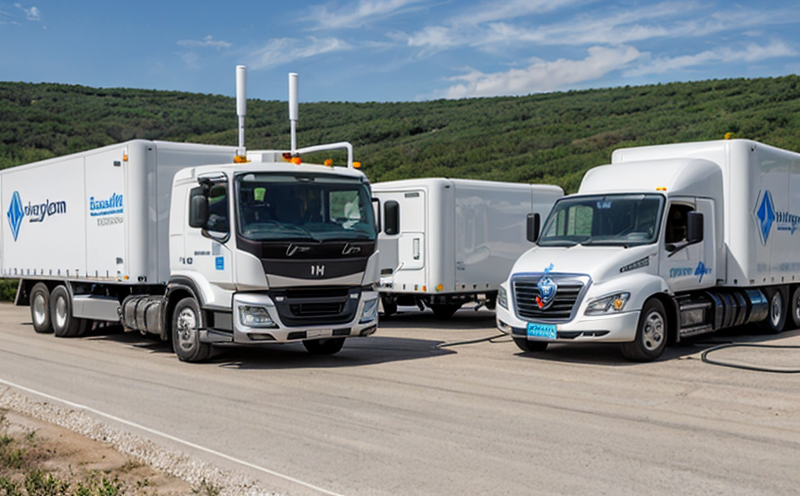ISO 11114 Compatibility Testing of Materials with Hydrogen
The testing of materials used in hydrogen systems against ISO 11114 standards is crucial for ensuring the integrity, safety, and long-term performance of components in hydrogen fuel cell technologies. This standard outlines specific procedures to evaluate the compatibility between materials and gaseous hydrogen. Compliance with ISO 11114 ensures that materials used in hydrogen applications can withstand the harsh conditions inherent to hydrogen environments without degradation or failure.
The testing process involves subjecting various specimens to controlled exposure to hydrogen gas under defined environmental parameters, including pressure, temperature, humidity levels, and duration of exposure. The aim is to determine whether the material undergoes any changes that could affect its performance over time or compromise system safety.
Hydrogen fuel cells are essential for generating electricity in stationary power plants as well as portable devices like cars and buses. Materials used within these systems must be robust against various factors such as corrosion, embrittlement, cracking, and other forms of degradation caused by prolonged contact with hydrogen gas. Understanding how different materials interact with hydrogen is vital to designing reliable and efficient fuel cell stacks.
The ISO 11114 framework provides standardized methods for assessing material compatibility through immersion tests where samples are submerged in liquid or gaseous hydrogen, as well as exposure studies conducted under ambient conditions. These procedures allow testing laboratories to identify potential vulnerabilities early on before they lead to operational issues.
The importance of this service cannot be overstated given the rapid growth in renewable energy sectors where hydrogen plays an increasingly significant role. As governments worldwide push towards cleaner energy solutions, ensuring that materials used in hydrogen infrastructure meet stringent safety standards becomes paramount.
Compliance with ISO 11114 ensures that manufacturers and users of hydrogen-based technologies can have confidence in their products' durability and reliability when operating under real-world conditions. By adhering to this international standard, companies not only demonstrate their commitment to quality but also safeguard against costly recalls or accidents resulting from substandard materials.
Given the critical nature of hydrogen fuel cells and electrolyzers in modern energy systems, it is essential that all materials used are thoroughly tested according to ISO 11114 guidelines. This testing helps prevent failures and ensures safe and efficient operation across various applications ranging from automotive fuel cell vehicles to industrial power generation.
Industry Applications
- Automotive Industry: Testing materials used in hydrogen fuel cells for cars, buses, and trucks to ensure they meet durability and safety standards.
- Renewable Energy: Evaluating components of wind turbines and solar panels that may be exposed to hydrogen during manufacturing or operation.
- Industrial Power Generation: Assessing materials employed in stationary fuel cell systems for continuous power supply.
- Medical Devices: Checking medical equipment utilizing hydrogen in their operational processes, ensuring biocompatibility and safety.
The results from ISO 11114 compatibility testing play a pivotal role in these industries by providing data that helps select appropriate materials for specific applications. This information is valuable not only during the development phase of new products but also throughout their lifecycle to maintain optimal performance and reliability.
Eurolab Advantages
At Eurolab, we pride ourselves on offering comprehensive hydrogen fuel testing services that adhere strictly to international standards like ISO 11114. Our experienced team of engineers combines cutting-edge technology with years of industry knowledge to deliver accurate and reliable test results.
- Accurate Results: Utilizing state-of-the-art analytical equipment ensures precise measurement of material properties under controlled conditions.
- Expertise: Leveraging our team's deep understanding of hydrogen technology allows us to provide tailored testing solutions for your unique needs.
- Compliance Assurance: Ensuring all tests are conducted according to the latest ISO guidelines guarantees that your materials will meet regulatory requirements worldwide.
- Supportive Documentation: Providing detailed reports and certificates of compliance helps you confidently communicate results with stakeholders.
We understand the importance of reliable testing in ensuring safe and efficient hydrogen systems. By partnering with Eurolab, you can trust that your materials will undergo rigorous evaluation to meet or exceed industry expectations.
Use Cases and Application Examples
- Fuel Cell Vehicle Development: Testing polymer electrolyte membrane (PEM) stacks used in hydrogen fuel cell vehicles for durability under real-world driving conditions.
- Hydrogen Storage Systems: Evaluating containers designed to store compressed hydrogen gas, ensuring they can withstand high-pressure environments without leakage.
- Electrolyzer Manufacturing: Assessing materials used in water electrolysis processes for their ability to produce clean hydrogen efficiently and safely.
- Mining Operations: Checking equipment used in underground mining sites exposed to hydrogen-rich atmospheres, ensuring safety during operations.
In addition to these examples, we also offer testing services for various other applications within the broader hydrogen economy. Our flexible approach allows us to accommodate diverse project requirements across multiple sectors.





